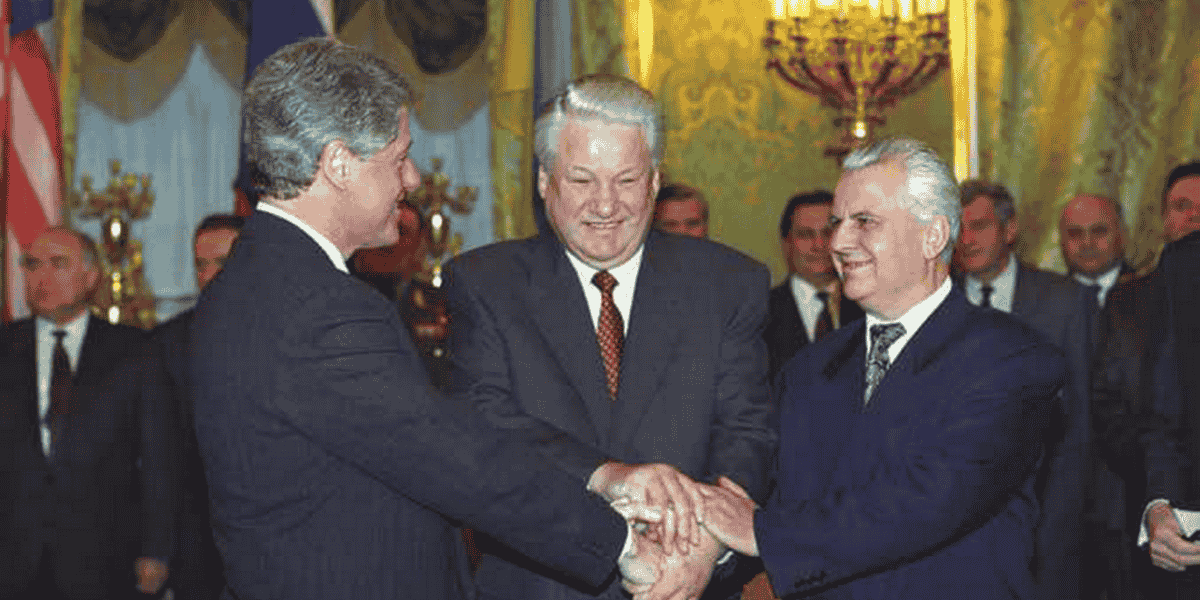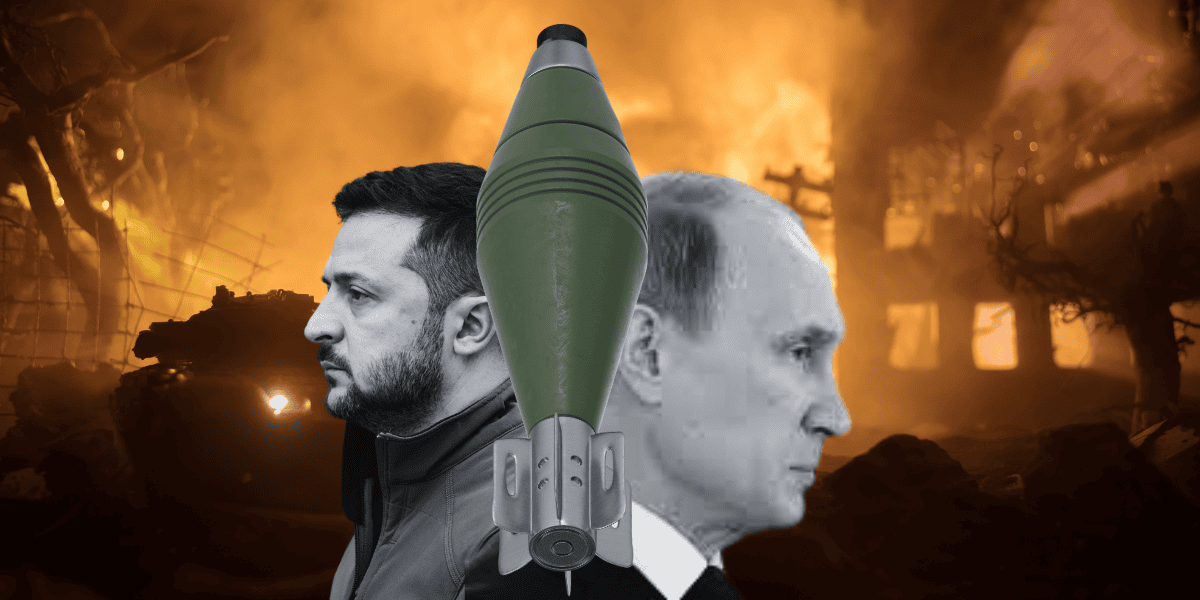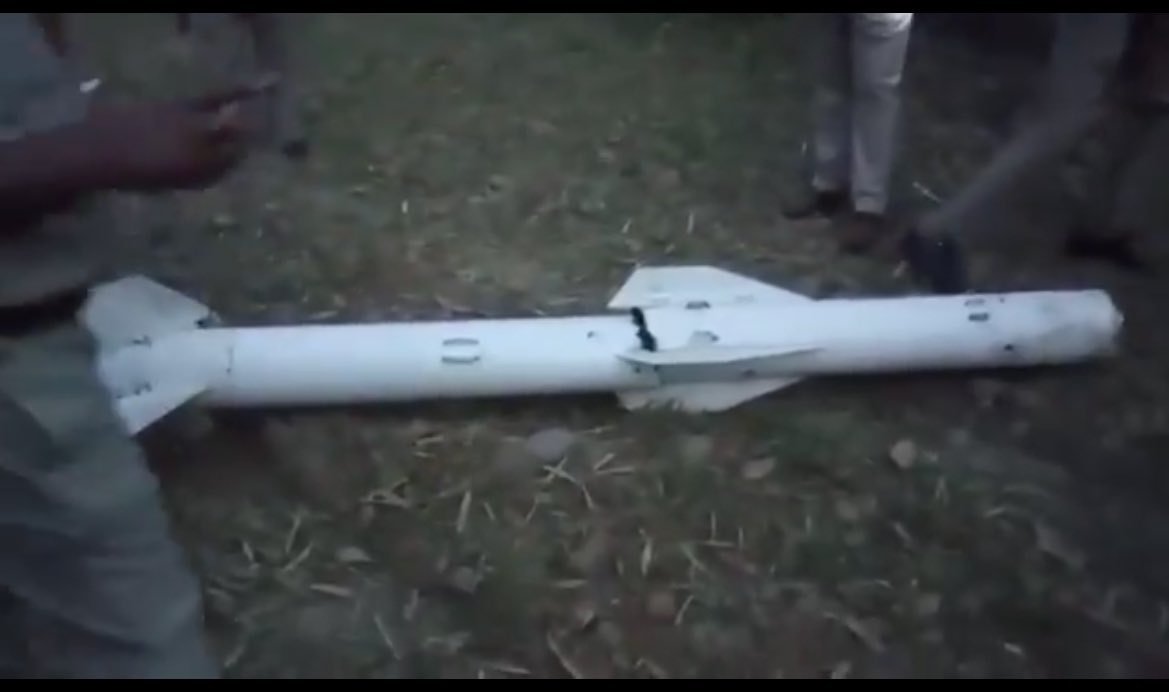Ahead of the grim occasion of the third anniversary of the war, Ukraine marked 30 years of the Budapest Memorandum, a decision that still haunts Kyiv.
On December 5, 1994, Ukraine gave away its substantial stockpile of Nuclear weapons in return for an ‘illusion of security’ that the USA, the UK, and Russia would protect its territorial integrity.
Twenty years later, in 2014, Russia seized Crimea. Thirty years later, in 2024, Russia has been at war with Ukraine for nearly three years.
The Path To Budapest Memorandum
On December 25, 1991, the Soviet Union’s hammer and sickle flag was lowered for the last time over the Kremlin. Earlier in the day, Mikhail Gorbachev resigned as president. Following the collapse of the Soviet Union, Ukraine inherited one of the most powerful armies and the third-biggest nuclear arsenal in the world.
According to various estimates, Ukraine had inherited 1,500 to 2,100 strategic and 2,800 to 4,800 tactical warheads.
Although Washington and Moscow had rarely been on the same page since the end of the Second World War in 1945, the issue of Kyiv having nuclear weapons brought the two countries together.
Having gained its independence in 1991 only, the young state of Ukraine was constantly pressurized both by the US and Russia to give away its nukes.
As the first president of Ukraine, Leonid Kravchuk, recalled, the US threatened sanctions and total isolation.
“Both Clinton and Vice President Al Gore said that if Ukraine did otherwise, they would impose economic and other sanctions. How could Ukraine, having just been born, immediately become a threat to Europe and the world,” he said in an interview.
On January 14, 1994, in a joint statement, Ukraine, Russia, and the US announced that Kyiv would give away its nukes in return for security guarantees by the West and Russia.
Later that year, on December 5, 1994, Ukraine signed the Budapest Memorandum with the US, UK, and Russia. Ukraine gave away its strategic nuclear weapons and agreed to join the Treaty on the Non-Proliferation of Nuclear Weapons (NPT).
In return, the US, UK, and Russia guaranteed not to use economic and military means to attack the country and pledged to respect its sovereignty and territorial integrity. Later, France and China also joined the Budapest Memorandum.

Leonid Kuchma, the second President of Ukraine and the guy who put his signature on the Budapest Memorandum recalled in 2009: “The then French President François Mitterrand said: “Son, don’t believe this document. You will be tricked, one way or the other,” Kuchma said at an international conference in Jerusalem.
Ukraine fulfilled its obligations on June 2, 1996, and officially lost its ‘nuclear’ status. In 2014, Russia, one of the signatories of the Budapest Memorandum, invaded Ukraine.
“In my opinion, this was one of the most remarkable stories of lies in the modern history of mankind. They signed a document with you that didn’t exist. That is an illusion-signing something that did not work. And everyone who signed it understood that” Mykhailo Podolyak, advisor to the head of the Presidential Office, told RBC-Ukraine.
Commenting on the failure of the Budapest Memorandum, Former Russian Chess grandmaster and Kremlin critic Garry Kasparov said on social media site X (formerly Twitter): “30 years ago in Budapest, Ukraine was pushed to surrender its most powerful weapons. One of the signatories, Russia, invaded Ukraine in 2014 & again in 2022. The US & UK have watched. Only strength guarantees peace.”
Ukraine President Volodymyr Zelenskyy also commented on the failure of the Budapest Memorandum to secure Ukraine. “Today is the 30th anniversary of the Budapest Memorandum. Ten years of war. Not a single day did this document work. And because of this, everyone in the world will now know that just the signature of any state, some assurances or promises are not enough for security.”
From Budapest Assurances To Tanks In Crimea
Current Russian President Vladimir Putin, who, as per President Zelenskyy, wants to destroy Ukraine as a nation, has himself on multiple occasions assured that Russia would not invade Ukraine or take away Crimea.
In 1999, two months into his first premiership under President Boris Yeltsin, Putin said in a TV interview in London: “We don’t want to take Crimea – that’s absolute stupidity.”
However, as soon as Kyiv tried to emerge from Moscow’s shadow and chart an independent path, Putin’s sense of history and understanding of Ukrainian nationhood changed. In 2014, Russia occupied Crimea and launched a low-level war in Eastern Ukraine’s Donbas region.
On February 21, 2022, three days before Russia’s full-scale invasion of Ukraine, Putin pontificated how Ukrainian nationhood was a myth.
In his address to the nation, Putin said: “I will start with the fact that modern Ukraine was entirely created by Russia or, to be more precise, by Bolshevik, Communist Russia. This process started practically right after the 1917 revolution.”
“Then, both before and after the Great Patriotic War, Stalin incorporated in the USSR and transferred to Ukraine some lands that previously belonged to Poland, Romania, and Hungary… and in 1954, Khrushchev took Crimea away from Russia for some reason and also gave it to Ukraine. In effect, this is how the territory of modern Ukraine was formed.”
In effect, Ukraine was never a nation; since it was not a nation, there is no question of honoring a treaty with it.
There is also considerable dispute over the meaning and actual words of the Budapest Memorandum.
The Ukrainian version of the Memorandum reads “Memorandum on Security Guaranties,” while the English version reads “Memorandum on Security Assurances.”
Essentially, Ukrainian sovereignty became an issue of semantics. The difference between the meanings of a ‘guarantee’ and an ‘assurance’ became the long distance between an independent, sovereign Ukraine and one forever under Moscow’s shadow.
Thirty Years Since Budapest Memorandum
Thirty years after the Budapest Memorandum and ten years after the Russian occupation of Crimea, Ukraine now realizes its folly, its Original Sin, but now cannot undo the past.
On December 3, the Ukrainian Ministry of Foreign Affairs issued a statement on the Budapest Memorandum’s catastrophic failure.
“The Budapest Memorandum failed to prevent the aggression of the Russian Federation, as a nuclear-weapon state, against Ukraine, as a state that has renounced its nuclear arsenal. Russia’s violation of the Budapest Memorandum set a dangerous precedent that undermined confidence in the very idea of nuclear disarmament. Instead, we see active attempts by various countries from the Indo-Pacific region and the Middle East to the Euro-Atlantic area to create or expand their existing nuclear arsenals.”
“Failure of the Budapest Memorandum to fulfill its functions has led to a catastrophic increase in security threats not only for Ukraine but also for other countries and regions…Today, the Budapest Memorandum is a monument to short-sightedness in strategic security decision-making,” the Ukrainian Foreign Ministry statement laments.
Ukraine cannot turn back the tide of history but now understands that NATO or protection under the US, UK, and French Nuclear umbrella is the best guarantee of its security.
The ministry emphasized that Ukraine now needs “clear and legally binding security guarantees.”
“Having learned from the bitter experience of the Budapest Memorandum, we will not accept substitutes or alternatives to full NATO membership,” the statement declared, highlighting the alliance as essential for countering Russian aggression.

Ukraine Was Not The Only Victim Of Nuclear Folly
If you think Ukraine was the only country in the world that foolishly gave up its nukes or nuclear program and paid a heavy price for it, think again. In the crazy 1990s, there were many nations and many dictators who fell victim to the empty rhetoric of security guarantees in exchange for nukes.
Iraq ended its nuclear program in 1991 following the first Gulf War. It was invaded by the US in 2003.
Muammar Gaddafi dismantled Libya’s nuclear program in 2003. He was overthrown by a NATO-led coalition and local forces in 2011.
North Korea reportedly acquired nuclear weapons in 2006. Kim Jong Un is still in power.
Following the collapse of the Soviet Union, two former Soviet republics, Belarus and Kazakhstan, also gave away their nukes in 1996. However, neither of these countries has openly challenged Moscow. Rather, they both are part of the Russia-led Collective Security Treaty Organization (CSTO) and enjoy protection under Moscow’s nuclear umbrella.
On the other hand, the superpowers that laid the NPT trap for these countries are themselves walking away from Nuclear prohibitions.
In 2019, the United States withdrew from the Intermediate-Range Nuclear Forces Treaty (INF), which banned intermediate-range land-based missiles, citing alleged Russian violations and China’s non-involvement. The US is also modernizing its nuclear arsenal, with plans to deploy nuclear weapons in more NATO states.
Russia has also updated its nuclear policy on first use. It can now use nuclear weapons on a non-nuclear state (read Ukraine) if aided by nuclear states. In 2023, Russia suspended participation in the New Strategic Arms Reduction Treaty (New START), which limited US and Russian-deployed nuclear weapons and delivery systems. In 2024, it stationed nuclear weapons in Belarus.
In short, if there is one lesson from the last thirty years of nuclear non-proliferation history, it is this: nuclear weapons are the best guarantor of your security.
- Sumit Ahlawat has over a decade of experience in news media. He has worked with Press Trust of India, Times Now, Zee News, Economic Times, and Microsoft News. He holds a Master’s Degree in International Media and Modern History from The University of Sheffield, UK.
- VIEWS PERSONAL OF THE AUTHOR
- He can be reached at ahlawat.sumit85 (at) gmail.com







